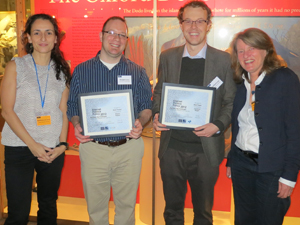We would like to thank everyone who participated in this year’s Policy & Internet conference at The University of Sydney. Focusing on the contested nature of ‘good’ Internet policy, we were joined by a range of outstanding scholars from institutions from around the world, including Nanyang Technological University; University of Tehran; Yale University; University of Technology Sydney; University of Queensland’s Indian Institute of Technology Delhi Academy of Research; University of Canberra; University of Milan; University of California; University of Edinburgh; Beijing Language and Culture University; King’s College London; Hebrew University of Jerusalem; Vrije Universiteit Brussel; and Universidad Catolica Del Uruguay. Over three days, scholars and students presented research and engaged in discussion on a broad range of Internet policy issues, everything from news media, politics, fashion and entertainment content regulations, misinformation, artificial intelligence, the digital platform political economy, digital content labour, online harms, security, sovereignty and data ethics. Associate Professor Julia Powles gave a highly provocative keynote presentation, challenging the dominant rhetoric in AI policy. In her talk titled The irresponsibility of responsible AI she reminded us that AI harm is a systemic issue that can not be meaningfully addressed through individual responsibility. On day two, Cheryl Langdon-Orr hosted a lively discussion exploring cutting-edge research into ‘everyday Internet and policy issues, covering online gambling, recommendation algorithms, online pornography, the consumption of news content on social media and the monetisation of children online. Another highlight of day two was the panel presented by the Charles Perkins Centre Truth Decay Node which provided the latest interdisciplinary research on how online arguments, images and narratives shape beliefs, and guidelines for countering the spread of dangerous belief systems. On day three we were joined by Andrew Francis from Australia’s competition authority, the ACCC, who has recently lead a multi-year inquiry into the digital platform economy, and Sophie Murray-Farell from the NSW Government Premier’s Department who are currently developing groundbreaking policy initiatives aimed a addressing…
Conferences
The Policy & Internet conference will bring together a range of international voices to demonstrate how varying approaches towards internet policy are established, embodied and engaged with by a variety of stakeholders. Together, scholars and policymakers will discuss current practices, alternative designs and the ‘unknowns’ that are required for inclusive internet governance.
Location:R.D. Watt BuildingCamperdown, NSW 2050, Australia Dates and time:2-4 October, 20248:30am – 5:30pm The Policy & Internet conference will bring together a range of international voices to demonstrate how varying approaches towards internet policy are established, embodied and engaged with by a variety of stakeholders. Together, scholars and policymakers will discuss current practices, alternative designs and the ‘unknowns’ that are required for inclusive internet governance. Conference program View the conference videos (coming soon) View our Mural View the conference photos (coming soon) Conference Organizers Day One: 2 October 2024 Keynote Speaker Associate Professor Julia PowlesDirector of the UWA Tech & Policy Lab Julia Powles is the Director of the UWA Tech & Policy Lab and Associate Professor of Law and Technology at the University of Western Australia. She is an international research leader in privacy, intellectual property, internet governance, and the law and politics of data, automation, and artificial intelligence. Her current research interests include Big Tech culpability, tech crimes, and data governance in health and performance contexts. Julia serves on Australian federal and state committees on generative AI in education, AI and copyright, privacy and responsible information sharing, responsible AI, and robotics. Prior to joining UWA, she worked at Cornell Tech, NYU, Cambridge, The Guardian, and the World Intellectual Property Organization. Julia studied genetics, biophysics, and law at ANU and UWA, and received her master’s from Oxford and PhD from Cambridge. Doctoral Paper Presentations Day Two: 3 October 2024 Paper presentations Everyday Internet & Policy Charles Perkins Centre Truth Decay Node PresentsThe psychology of online arguments and narratives Conference Conclusion Chair: Dr Jonathon Hutchinson Chair of Discipline of Media and Communication at the University of Sydney He is a Chief Investigator on the Australian Research Council LIEF project ‘The International Digital Policy Observatory,’ and is also a Chief Investigator on the eSafety Commission Research project ‘Emerging online safety issues: co-creating social media education with young people.’ For 2023 and…
Join us in shaping Internet policy discourses at a conference designed to challenge, inspire and innovate
Location:R.D. Watt Building & onlineCamperdown, NSW 2050, Australia Dates and time:2-4 October, 20248:30am – 5:30pm The Policy & Internet conference will bring together a range of international voices to demonstrate how varying approaches towards internet policy are established, embodied and engaged with by a variety of stakeholders. Together, scholars and policymakers will discuss current practices, alternative designs and the ‘unknowns’ that are required for inclusive internet governance. Conference Organizers Local Transport Getting to/from the airport You can access taxis and rideshare services when you arrive. The Sydney CBD is a short, 20 minute ride away and will cost about 45-55 AUD one way. You’ll find taxi ranks at the front of all terminals – simply follow the signs to the nearest ranks. For rideshare services, please arrange with your driver to meet you at the priority pick-up area. Sydney Airport is located just 13 minutes by train from the city. Airport Link offers a fast and convenient way to reach the city and suburbs, with trains running approximately every 10 minutes. To use this service, you can either purchase an Opal Card from the station or WH Smith, or tap on with your Amex, Visa or Mastercard. The train costs up to 38 AUD one way. Public transport You can pay with contactless-enabled American Express, Mastercard or Visa credit or debit cards or a linked device, by tapping on and tapping off at Opal readers. Contactless payments are available on all public transport in the Opal network and you will receive the same travel benefits of an Adult Opal card. Alternatively, the Opal card is an easy, convenient way of paying for your travel on public transport in Sydney. It can be used on all public transport, including trains, ferries, buses and light rail. There are daily and weekly caps on the Opal network, meaning you can travel as much as you like within the Opal network and you never…
Join us in shaping Internet policy discourses at a conference designed to challenge, inspire and innovate.
Location:RD Watt Seminar Room, University of Sydney, Australia, and online Dates and time:2 – 4 October 2024 As our digital society advances, an increasingly diverse array of stakeholders are seeking to have a greater say in its governance (Calandro, 2015, Aguerre, 2020, Tjahja et al, 2022), making the challenge of policymaking for the Internet more complex and contested (Kettemann, 2020, Belli et al, 2023). The 2024 Policy & Internet conference, hosted by the University of Sydney, invites scholars, policymakers, civic interest groups, platform providers and regulatory bodies to participate in a dialogue about the nature of ‘good Internet policy’. Set against the backdrop of significant global events like NetMundial+10 and the United Nations Global Digital Compact, the conference seeks to unravel the complexities of Internet governance and policymaking and to explore diverse pathways towards a ‘good’ future for the Internet for all. This conference aims to explore foundational questions and new frontiers in Internet policy and invites contributions that address but are not necessarily limited to the following topics: Defining Good Policy: What constitutes good Internet policy? Which norms and values are pivotal in shaping these policies? Policy Innovation and Ecosystems: What current innovations are shaping policy landscapes? Are these ecosystems effective, and how might they be reimagined? Norm Entrepreneurship: How are different stakeholders championing innovative norms to address the myriad challenges in Internet policy? Processes and Mechanisms: What are the key processes and mechanisms in crafting effective Internet policies? Policy Spaces: Where is Internet policy formulated? Which forums or platforms are or should be central to these discussions? Inclusivity in Policymaking: Who currently influences Internet policy, and who should be involved in these discussions? Impact of Emerging Technologies: How do emerging technologies reshape the frameworks and priorities of Internet policy? Regulatory Expertise: What expertise is necessary to navigate and enhance the efficacy of Internet policy-making? We invite submissions that address the above themes, but also encourage papers that propose…
The conference brought together leading local and international scholars and practitioners from the fields of communication, political and computational sciences and law.
The Policy & Internet Journal, housed at the School of Art, Communication and English, held its annual conference on the 28-29 of September in the Social Sciences Building of the University’s Camperdown campus. With an Asia-Pacific focus, the event was themed around policy inclusion within the scope of digitalisation and new technologies. The conference brought together leading local and international scholars and practitioners from the fields of communication, political and computational sciences and law. Editor Dr Joanne Gray with keynote speaker,Professor Johanna Weaver. “One of the most important items to emerge from the conference is the importance of integrating empirical research findings to inform good tech policy, or ‘good policy’, as it was referred to many times across the two days,” said Dr Jonathon Hutchinson, Editor-in-Chief of Policy & Internet. Notable speakers at the conference included Professor Johanna Weaver from the Australian National University in Canberra and Dr Justine Humphry from the University of Sydney. Presenters showcased a wide-reaching scope of papers that tackled the all-important realms of governance, policy design, content moderation, and inclusion. EIC, Dr Jonathon Hutchinsonchairing the e-Safety: Youth anddigital media policy panel. Panels included e-Safety: Youth and digital media policy, chaired by Dr Jonathon Hutchinson, with speakers from the e-Safety Commissioner — including Nikky Sloss, Manager of Children, Youth and Families — along with academics from the University of Sydney, Dr Justine Humphry and Dr Catherine Page-Jeffrey. Professor Catharine Lumby chaired Digital Hostility, policy and Social Change, which explored online hostility and its origins. The panel included academics from the University of Melbourne and RMIT, Professor Rob Cover, Dr Jay Daniel Thompson, and Dr Jennifer Beckett. The last panel of the two-day conference, chaired by Dr Joanne Gray, titled Chat GPT and Gender Bias in the Asia Pacific Region. The discussion focused on how algorithms reflect and perpetuate gender inequity, notably from the experiences of lead researcher Dr Aim Simpeng, who co-presented the initial findings with Dr Olga Boichek. ‘With…
Together, scholars and policymakers will discuss current practices, alternative designs and the ‘unknowns’ that are required for inclusive internet governance.
Policy innovation for inclusive internet governance Location:Social Sciences Building (A02), Lecture Theatre 200, University of Sydney, Camperdown Campus Dates and time:28-29 September, 20238:30am – 4:30pm The Policy & Internet conference will bring together a range of international voices to demonstrate how varying approaches towards internet policy are established, embodied and engaged with by a variety of stakeholders. Together, scholars and policymakers will discuss current practices, alternative designs and the ‘unknowns’ that are required for inclusive internet governance. Conference program Register now Day One: 28 September 2023 Keynote Speaker:Professor Johanna Weaver Founding Director of the Tech Policy Design Centre at the Australian National University (ANU) A recovering diplomat, and reformed commercial litigator, Professor Weaver champions tech policy as a tool to shape technology for the long-term benefit of humanity. Prior to joining ANU, Professor Weaver completed her term as Australia’s independent expert and lead negotiator on cyber issues at the United Nations. Earlier she led the Cyber Affairs Branch at the Australian Department of Foreign Affairs and Trade, working closely with Australia’s inaugural Ambassador for Cyber Affairs. Professor Weaver is a member of the International Committee of the Red Cross (ICRC) Global Advisory Board on digital threats during conflict. Panels: e-Safety: Youth and digital media policy Chair: Dr Jonathon Hutchinson Chair of Discipline of Media and Communication at the University of Sydney He is a Chief Investigator on the Australian Research Council LIEF project ‘The International Digital Policy Observatory,’ and is also a Chief Investigator on the eSafety Commission Research project ‘Emerging online safety issues: co-creating social media education with young people.’ For 2023 and 2024, he holds the prestigious position of President of the Australian and New Zealand Communication Association and is the current Editor in Chief of the Policy & Internet Journal. His most recent book, Digital Intermediation: Unseen infrastructure for cultural production, is available through Routledge. Panellists Presenters: Inclusivity Chair: Professor John Hartley, A.M Research professor in the…
Examining how the current developments within digital media spaces has a regulatory impact.
Datafication. Platformisation. Metaverse.The state of global internet policy Location:The Women’s College 15 Carillon Avenue,Newtown NSW 2042 AustraliaDay One: The Sibyl CentreDay Two: Menzies Common Room Dates and time:28-29 September, 20228:30am – 6:30pm Our invited speakers will address the conference theme, Datafication. Platformisation. Metaverse. The state of global internet policy, which examines how the current developments within digital media spaces has a regulatory impact. The conference will present cutting edge research from areas around the globe that address issues such as what is the current state of play for the platform society and its consequent internet regulation, how internet regulation include/exclude groups and individuals, and the consequences of contemporary communication environment. Through a series of keynote presentations and plenary panels, the 2022 Policy & Internet Conference will set the trajectory for the next 12 months of scholarship in this space. Morning tea, lunch, afternoon tea, and a cocktail event (Day Two) included. Conference program Register now Day One: 28 September 2022 Keynote Speaker:Professor John Hartley Research professor in the Department of Media and Communications at the University of Sydney Previously he was Head of the School of Journalism, Media and Culture at Cardiff University, Dean of Creative Industries at QUT, is John Curtin Distinguished Emeritus Professor at Curtin University. Hartley founded the International Journal of Cultural Studies (Sage), which he edited for 20 years, and Cultural Science Journal (Sciendo). His recent books On the Digital Semiosphere (Bloomsbury) and Advanced Introduction to Creative Industries (Elgar) seek to widen the scope of global technological and media analysis to include the crucial role of culture. Keynote Speaker:Associate Professor Crystal Abidin Associate Professor, Principal Research Fellow, & ARC DECRA Fellow in Internet Studies, Programme Lead of Social Media Pop Cultures at the Centre for Culture and Technology (CCAT) at Curtin University. She is also Affiliate Researcher with the Media Management and Transformation Centre at Jönköping University. She recently received the International Communication Association Popular Communication Early Career Scholar Prize and ABC TOP 5 Humanities Fellowship. Panels: Emerging Internet Policy…
Big data generation and analysis requires expertise and skills which can be a particular challenge to governmental organisations.
Recent years have seen an increasing buzz around how ‘Big Data’ can uncover patterns of human behaviour and help predict social trends. Most social activities today leave digital imprints that can be collected and stored in the form of large datasets of transactional data. Access to this data presents powerful and often unanticipated opportunities for researchers and policy makers to generate new, precise, and rapid insights into economic, social and political practices and processes, as well as to tackle longstanding problems that have hitherto been impossible to address, such as how political movements like the ‘Arab Spring’ and Occupy originate and spread. Opening comments from convenor,Helen Margetts While big data can allow the design of efficient and realistic policy and administrative change, it also brings ethical challenges (for example, when it is used for probabilistic policy-making), raising issues of justice, equity and privacy. It also presents clear methodological and technical challenges: big data generation and analysis requires expertise and skills which can be a particular challenge to governmental organisations, given their dubious record on the guardianship of large scale datasets, the management of large technology-based projects, and capacity to innovate. It is these opportunities and challenges that were addressed by the recent conference “Internet, Politics, Policy 2012: Big Data, Big Challenges?” organised by the Oxford Internet Institute (University of Oxford) on behalf of the OII-edited academic journal Policy and Internet. Over the two days of paper and poster presentations and discussion it explored the new research frontiers opened up by big data as well as its limitations, serving as a forum to encourage discussion across disciplinary boundaries on how to exploit this data to inform policy debates and advance social science research. Duncan Watts (Keynote Speaker) The conference was organised along three tracks: “Policy,” “Politics,” and Data+Methods (see the programme) with panels focusing on the impact of big data on (for example) political campaigning, collective action and political dissent, sentiment…
Making an assessment of the Internet’s impact on politics and policy.
Our two-day conference is just about to come to an end with an evening reception at Oxford’s Ashmolean Museum (you can have a live view through OII’s very own webcam). Its aim was to try to make an assessment of the Internet’s impact on politics and policy. The presentations approached this challenge from a number of different angles and we would like to encourage everyone to browse the archive of papers on the conference website to get a comprehensive overview about much of the cutting-edge research that is currently taking place in many different parts of the world. The submissions to this conference allowed setting up very topical panels in which the different papers fitted together rather well. Helen Margetts, the convenor, highlighted in her summary just how much discussion and informed exchange has been going on within these panels. But a conference is more than the collection of papers delivered. It is just as much about the social gathering of people who share similar interests and the conference schedule tried to accommodate for this by offering many coffee breaks to encourage more informal exchange. It is a testimony to the success of this strategy that the majority of people have very much welcomed the idea to have a similar conference in two years time, details of which are yet to be confirmed. Great thanks to everybody who helped to make this conference happen, in particular OII’s dedicated support staff such as journal editor David Sutcliffe and events manager Tim Davies.
What he sees at stake is power because of the permanent threat of our activities are being watched by others—not necessarily now but possibly even in the future—can result in altering our behaviour today.
Our two-day conference is coming to a close with a keynote by Viktor Mayer-Schönberger who is soon to be joining the faculty of the Oxford Internet Institute as Professor of Internet Governance and Regulation. Viktor talked about the theme of his recent book “Delete: The Virtue of Forgetting in the Digital Age” (a webcast of this keynote will be available soon on the OII website but you can also listen to a previous talk here). It touches on many of the recent debates about information that has been published on the web in some context and which might suddenly come back to us in a completely different context, e.g. when applying for a job and being confronted with some drunken picture of us obtained from Facebook. Viktor puts that into a broad perspective, contrasting the two themes of “forgetting” and “remembering”. He convincingly argues how for most of human history, forgetting has been the default. This state of affairs has experienced quite a dramatic change with the advances of the computer technology, data storage and information retrieval technologies available on a global information infrastructure. Now remembering is the default as most of the information stored digitally is available forever and in multiple places. What he sees at stake is power because of the permanent threat of our activities are being watched by others—not necessarily now but possibly even in the future—can result in altering our behaviour today. What is more, he says that without forgetting it is hard for us to forgive as we deny us and others the possibility to change. No matter to what degree you are prepared to follow the argument, the most intriguing question is how the current state of remembering could be changed to forgetting. Viktor discusses a number of ideas that pose no real solution: privacy rights – don’t go very far in changing actual behaviour information ecology – the idea to store only as much…









